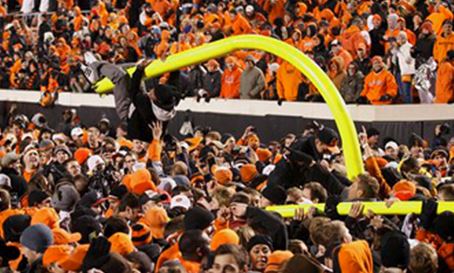Podcast: Play in new window | Download
Subscribe: RSS
Our days of watching those overly excited college football fans rushing onto the field after an exciting victory may soon be coming to an end. That is, if the NCAA and your college football conference have anything to do with it.
This spontaneous act of celebration usually comes under one of two scenarios:
- Your home football team has defeated a favored bitter rival for the first time in years.
- Your home team (as a bona fide underdog) has risen to the occasion to defeat a nationally ranked opponent.
Most school and team officials are able to anticipate the possibility that such a rowdy post-game celebration on the field could occur.
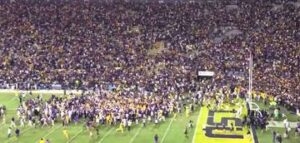
For example, let’s head to Baton Rouge. When LSU has a multi-year losing streak against the team’s former coach Nick Saban and the Alabama Crimson Tide, there will be a good chance that Tiger fans may come rushing onto the field if LSU should break a losing streak.
The LSU public address announcer will dutifully warn the crowd before the game, during the game, and minutes before it ends. The verbal warnings simply will not work with 102,000 ecstatic fans ready to help celebrate the end of that losing streak with their victorious football team.
Let’s face it. When your college football team defeats its biggest rival – at home – for the first time in years, the home team fans may feel the necessity to release a lot of pent-up emotion.
It certainly doesn’t help matters if many of these fans are inebriated by the end of the game.

Thousands of drunk and sober fans still find a way to jump directly onto the field as the final seconds come off the clock as they quickly swarm the football field in celebration.
This massive rush onto the field puts the opposing team, its coaches, and the game officials in a bit of danger, too.
The opposing team’s players are unhappy about the defeat. The players certainly don’t need the other school’s students taunting them as they try to make their way back to the locker room after the game ends.
The home team’s players are much more understanding. As long as the jubilant fans remain respectful, the players (being college students, too) are happy to oblige the approaching throng.
This onrush of stadium supporters must feel like a giant wave of happiness descending upon the field.
It carries a lifetime of memories for most involved.
Unfortunately, some of those fans also retain long-term memories of minor and severe injuries while trying to scale barriers and jump from ten or more feet down onto the field. Sprained or broken ankles and leg injuries are becoming more common during these bursts of positive pandemonium.

Right on cue, the legal profession has gotten into the act, too. Attorneys for some people injured in post-game celebrations have attempted to recover damages from schools for their clients who have been sustained injuries.
A website promoting sports litigation (yes, there is such a thing) cited a case where a football goal snapped under the weight of fans who had climbed onto it during a post-game celebration. The goal post (which cost $20,000) weighed 600 pounds (prior to the addition of enthusiastic post-game climbers). The goal post fell onto someone’s head below and caused a fractured skull and brain damage.
An attorney sued the university on behalf of the injured fan. The legal position was that the University had not adequately warned all fans that rushing the field after the game was prohibited and potentially dangerous.
The University of Alabama football team knows more about this phenomenon than any other college football team in America.

The most successful team in college football over the past two decades rarely loses more than one or two games in a season. Alabama rarely loses at home or on the road during most recent seasons.
In 2022, the Alabama football team was involved in two separate post-game spontaneous celebrations. Unfortunately, neither event occurred in Tuscaloosa.
A rare loss by Bama to an SEC rival on the road is a big deal to most SEC opposing fans. Last year, Alabama’s football team was swarmed by opposing fans in both Knoxville and Baton Rouge after road losses at Tennessee and LSU.
After 24 years of frustration against Alabama’s football team, gleeful Tennessee fans somehow managed to storm the field, dismantle the goal post, carry it outside of the football stadium and dump it into the nearby Tennessee River!

The Southeastern Conference understands how passionate its fans are. The slogan of cable television’s SEC Network even says, “It just means more”.
It has always been that way here in the Deep South.

The SEC is trying to discourage its fans to end these on-field spontaneous celebrations beginning this season. It will also help the league and its schools to avoid unnecessary injuries to the players, the fans, and thousands of dollars in equipment losses and repairs to the playing surfaces.
Did I also say to help reduce expensive lawsuits?
Large fines have been doled by the SEC for years. Last year, the University of Tennessee was fined $100,000 by the league after its glorious post-game celebration on the field after beating Alabama. The Tennessee athletic donors were more than happy to ante-up to repay the athletics department for the fine and the cost of clean-up.
According to one source, neither Alabama nor Florida has been the site of fans storming onto the home football field after a tense victory. In Bama’s case, the prevailing thought seems to be, “We only celebrate championships.” In Gainesville, Florida, Gator fans consider the turf on Florida Field to be sacred.
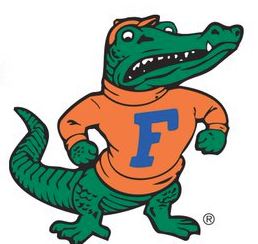
A few weeks ago, a report surfaced recently that the SEC is giving thought to a more severe form of punishment to end post-game celebrations on the football field. If the plan is enacted, the league has the right to take away the next home game against that same opponent.
For example, Alabama will not only host this year’s match-ups with Tennessee and LSU in 2023, it would also host the 2024 games – which are currently scheduled to be played in Knoxville and Baton Rouge.
OUCH!
If that rule had been in effect in 2022, it would have meant the loss of millions of dollars in revenue for the athletic departments of Tennessee and LSU.

ANY GOOD IDEAS ON HOW TO RESOLVE THIS PROBLEM?
Perhaps the most civil answer to ending this growing problem lies in the small city of Clemson, South Carolina. Tiger fans now call their post-game celebration the “Gathering at the Paw.”
This unique Clemson University tradition began upon the opening of Memorial Stadium in 1942. Frank Howard, Clemson’s head football coach from 1940 to 1969, allowed ticket holders to come onto the field right after every home game as a positive way for fans to engage with the players.
The post-game celebration became known as “Gathering at the Paw” in 2003 after the school enacted some restrictions to help prevent a bit of rowdy behavior which occurred in 2002.
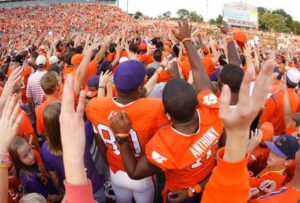
Once every Clemson football game ends, the two goal posts are quickly removed via a retractable mechanism. The opposing team is also given a little time to safely make its way into the locker room.
Finally, the Clemson fans are invited onto the field using just a few designated ramps (to avoid injuries by fans from jumping over retaining walls). The Tigers football team is then joined on the field by the crowd as they surround the Clemson Tiger Paw logo at midfield. The band then plays the school’s alma mater. The assembled mass of humanity is allowed to linger on the football field for a short period.
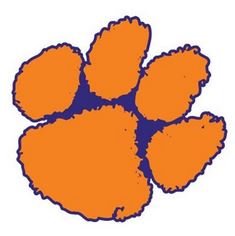
This seems like a plausible idea for SEC schools (at least those not named Alabama or Florida) to try beginning this fall.
I would like to see the SEC utilize some of its growing wallet of television money to pay for the initial installation of retractable goal posts at each conference football stadium. Once completed, it would be up to each SEC member school to devise a plan to permit a safer and more orderly entrance onto the football field by home fans.
The SEC’s newly proposed and rather draconian punishment plan for fans rushing the football field is scheduled to be discussed at the league’s upcoming annual meeting in Destin, Florida on May 30. Let’s hope that a more practical solution (such as Clemson’s post-game celebration) might be adopted rather than moving a future football game away from a team with an overenthusiastic home crowd.

Money talks, so I expect Tennessee and LSU will bring some good ideas to the table at the SEC annual meetings later this month.

